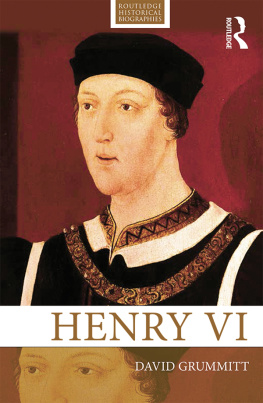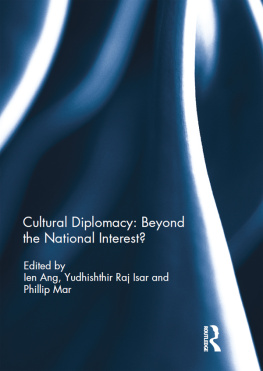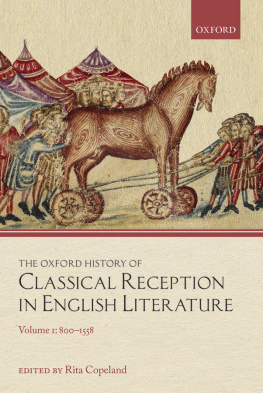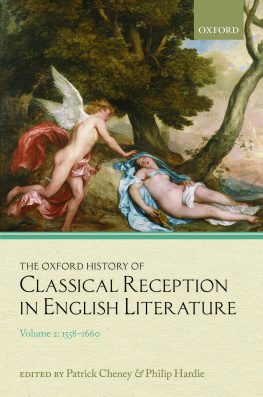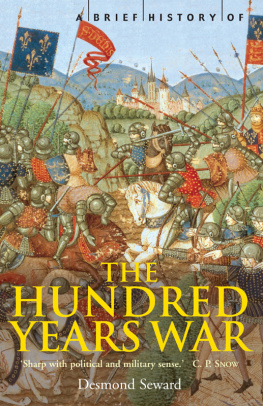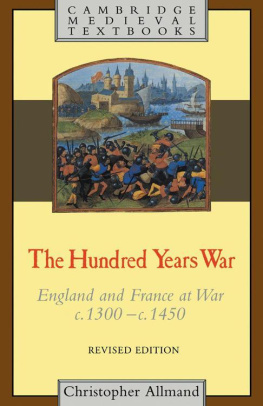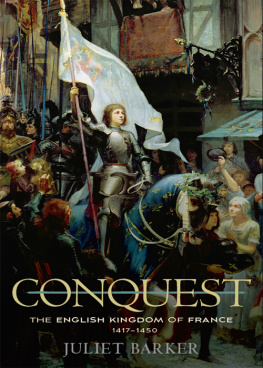THE ENGLISH EXPERIENCE IN FRANCE c. 1450-1558
The English Experience in France c. 1450-1558
War, diplomacy and cultural exchange
Edited by
David Grummitt
History of Parliament, London
First published 2002 by Ashgate Publishing
Reissued 2018 by Routledge
2 Park Square, Milton Park, Abingdon, Oxon OX14 4RN
711 Third Avenue, New York, NY 10017, USA
Routledge is an imprint of the Taylor & Francis Group, an informa business
Copyright David Grummitt 2002
The editor hereby asserts his moral right under the Copyright, Designs and Patents Act, 1988, to be identified as the editor of this work.
All rights reserved. No part of this book may be reprinted or reproduced or utilised in any form or by any electronic, mechanical, or other means, now known or hereafter invented, including photocopying and recording, or in any information storage or retrieval system, without permission in writing from the publishers.
Notice:
Product or corporate names may be trademarks or registered trademarks, and are used only for identification and explanation without intent to infringe.
Publisher's Note
The publisher has gone to great lengths to ensure the quality of this reprint but points out that some imperfections in the original copies may be apparent.
Disclaimer
The publisher has made every effort to trace copyright holders and welcomes correspondence from those they have been unable to contact.
A Library of Congress record exists under LC control number: 2002016497
ISBN 13: 978-1-138-74292-5 (hbk)
ISBN 13: 978-1-315-18200-1 (ebk)
David Grummitt is a Research Fellow at the University of Oxford and has published a number of articles on Calais under English rule.
Anne Curry is Professor of History at the University of Reading and has published numerous books and articles on the Hundred Years War.
Edward Meek has recently completed a PhD at the University of Cambridge on the diplomacy of Edward IV.
Michael K. Jones is a freelance historian who is writing a book on the Battle of Bosworth and is co-author of The King's Mother, a biography of Lady Margaret Beaufort.
John M. Currin is Adjunct Professor, Arizona Center for Medieval and Renaissance Studies, Arizona State University and has written extensively on the diplomacy of Henry VII.
Charles Giry-Deloison is Matres de Confrences, Histoire Moderne at the Universit d'Artois. He has written widely on Anglo-French diplomacy in the fifteenth and sixteenth centuries.
Robert J. Knecht is Emeritius Professor of History at the University of Birmingham and author of biographies of Francis I, Catherine de Medici and Cardinal Richelieu.
Luke MacMahon has recently completed a PhD on English diplomacy during the reign of Henry VIII.
David Potter is Senior Lecturer at the University of Kent. He is author of A History of France 1460-1560 and numerous articles on Anglo-French relations.
- ADN Archives Departementales du Nord, Lille
- AN Archives Nationale, Paris
- BL British Library, London
- BNF Bibliothque Nationale de France, Paris
- CAF Catalogue des actes de Francois Ier (10 vols., Paris, 1887-1908)
- CPR Calendar of Patent Rolls Preserved in the Public Record Office 1399-1509 (17 vols., London, 1903-16)
- CSP Milan Cal
- CSP Spanish Calendar of State Papers Spanish, ed. P. de Gayangos, G. Mattingley, M. A. S. Hume and R. Tyler (15 vols, in 20, London, 1862-1954)
- CSP Venetian Calendar of State Papers Venetian, ed. R. Brown, C. Bentinck and H. Brown (9 vols., London, 1864-98)
- EHR English Historical Review
- Feodera Foedera, Conventiones, Litterae, et Cujuscumque Generis Acta Publica... etc., ed. T. Rymer (20 vols., London, 1727-35)
- Lisle Letters The Lisle Letters, ed. Muriel St. Clare Byrne (6 vols., Chicago and London, 1981)
- LP Letters and Papers, Foreign and Domestic, of the Reign of Henry VIII, 1509-1547, ed. J. Brewer, J. Gairdner and R. H. Brodie (21 vols, and addenda, London, 1862-1932)
- NMS Nottingham Medieval Studies
- PRO Public Record Office, Kew
- RP Rotuli Parliamentorum, 1278-1504, ed. J. Strachey et al, (6 vols., London, 1767-1832)
- Scarisbrick J. J. Scarisbrick, Henry VIII (first published 1969, 2nd edn. New Haven, CT, 1997)
- SR Statutes of the Realm , ed. A. Luders et al. (11 vols., London, 1810-28
- State Papers, Henry VIII State Papers Published under the Authority of his Majesty's Commission, King Henry VIII (11 vols., London, 1830-52)
DAVID GRUMMITT
The nine essays presented in this volume represent some of the latest research on the relationship between England and France in the century after the end of the Hundred Years War. They fall into three main categories: the administration and importance of the English possessions in France; the practice of war and diplomacy; the personal experiences of Englishmen in France and the friendships they developed there. All explore one or more of the three themes of this volume - war, diplomacy and cultural exchange. The purpose of this introduction, then, is to outline the main events and historiographical trends in these three areas and to provide the background to the arguments presented in the essays themselves.
War
The Hundred Years War ended in ignominious defeat for the English. Even if his involvement in domestic politics was erratic, Henry showed some appetite for intervening in foreign affairs and by the end of 1446 was committed to the surrender of Maine and Anjou in order to buy peace with France. However, the idea of a totally pacifist king, resigned to peace at any price, seems at odds with the decision taken soon after to support his close friend, Gilles de Bretagne's, son of Duke Jean IV and Jeanne of Navarre, claim to the dukedom of Brittany. In March 1449 the town of Fougres in Brittany fell to an assault in the name of Henry VI; if this break of the terms of the truce negotiated at Tours in 1444 (and extended in 1448) was not enough, the accusations of French perfidy which arose from the town's surrender to Charles VII of France the following November provided the immediate backdrop for the French reconquest of Normandy. Between May 1449, when the castle at Pont de l'Arche was taken by the French and Bretons, and 12 August 1450, when Cherbourg surrendered, the Norman conquests of Henry V were lost in one of the most spectacular military campaigns of the fifteenth century. After Normandy, Charles and his armies turned their attention to Gascony. On 23 October 1452 Bordeaux fell and on 17 July the following year an English army, led by that great hero of the wars with France, John Talbot, Earl of Shrewsbury, was defeated at Chastillon. The death of Talbot and Henry's ensuing collapse into madness sounded the death-knell of Lancastrian kingship.
The opportunities that war offered for honour and personal advantage largely explain Edward IV's decision to invade France in the summer of 1475. J. R. Lander doubted if this was a serious attempt to assert Edward's claim to the French crown, but it seems clear that by at least 1472 the king was determined to emulate the achievements of Henry V. This is apparent in his interest in the order of the Garter and in the scale of the


